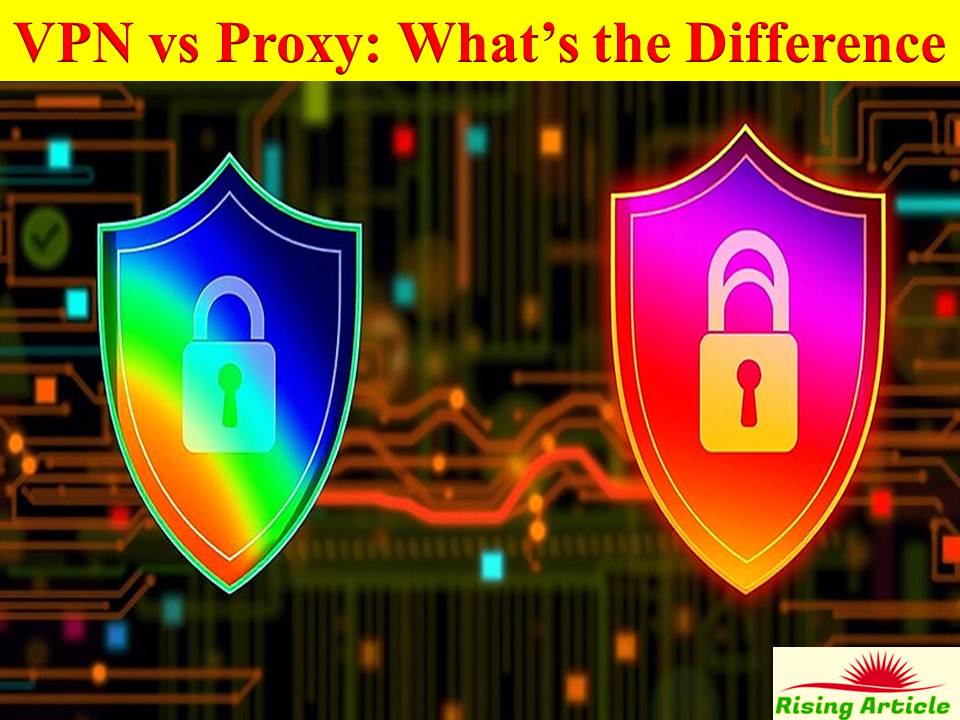VPN vs Proxy – Which One Should You Choose in 2025? 🤔🔑
In 2025, online privacy and security have never been more important. As cyber threats grow and online surveillance becomes more pervasive, many users are turning to tools like VPNs and proxies to protect their personal information. Both of these tools are designed to help users mask their IP addresses, encrypt data, and access blocked content, but they work in very different ways.
While VPNs (Virtual Private Networks) and proxies are often discussed together, it’s important to understand the key differences between them, so you can make an informed decision about which one suits your needs.
In this article, we will explore the differences between VPNs and proxies, their pros and cons, and which tool is right for you based on your privacy, security, and browsing needs.
 📊 VPN vs Proxy: Quick Comparison
📊 VPN vs Proxy: Quick Comparison
| Feature | VPN (Virtual Private Network) | Proxy |
| Encryption | Strong encryption to secure all internet traffic | No encryption (unless using a secure proxy) |
| Privacy Protection | Masks your IP address and encrypts all online activity | Hides your IP but doesn’t encrypt traffic |
| Speed | Can slightly reduce speed due to encryption | Generally faster, no encryption overhead |
| Security | Strong protection against hackers, trackers, and spying | Limited security, vulnerable to data leaks |
| Bypass Restrictions | Effective at bypassing geographical restrictions and censorship | Can bypass content restrictions, but less secure |
| Device Support | Works across all applications and devices | Usually works only with browsers or apps configured |
| Cost | Often requires a paid subscription | Many free proxies available, but some are unreliable |
🚀 Conclusion: Both VPNs and proxies are useful for privacy and security, but they offer different levels of protection. Let’s break down how they work in more detail.
️⃣ What Is a VPN and How Does It Work? 🔐💻
A VPN (Virtual Private Network) is a service that creates a secure tunnel between your device and the internet, encrypting all of your internet traffic and masking your IP address. When you connect to a VPN, your device routes its internet connection through a remote server, making it appear as if you are browsing from a different location.
✅ Key Features of a VPN:
✔️ Full Encryption – VPNs encrypt all your data, making it unreadable to hackers, even on public Wi-Fi networks.
✔️ Enhanced Privacy – Your real IP address is hidden, and your online activities are protected from websites, advertisers, and other third parties.
✔️ Access Blocked Content – VPNs can bypass geo-restrictions and access content blocked in certain countries (e.g., Netflix, BBC iPlayer).
✔️ All-Inclusive Protection – VPNs protect your entire device, including all applications, not just the web browser.
❌ Drawbacks of a VPN:
❌ Reduced Speed – Due to the encryption process, VPNs can slightly reduce your internet speed.
❌ Paid Subscription – Most reliable and fast VPN services are paid, although there are some free options with limited features.
💡 Best For: Users looking for high security, privacy, and the ability to access blocked content on all devices.
️⃣ What Is a Proxy and How Does It Work? 🌐🔑
A proxy server works by acting as an intermediary between your device and the internet. When you use a proxy, your internet traffic is routed through the proxy server, and websites only see the proxy’s IP address, not your own. Unlike a VPN, most proxies don’t encrypt your data, which makes them faster but less secure.
✅ Key Features of a Proxy:
✔️ Hides Your IP Address – Proxies change your visible IP address, helping you maintain some level of anonymity online.
✔️ Bypasses Geoblocks – Proxies can mask your location and let you access region-restricted content.
✔️ Cost-Effective – Many free proxies are available, making them a budget-friendly option.
✔️ Speeds Up Browsing – Without encryption overhead, proxies can offer faster browsing speeds compared to VPNs.
❌ Drawbacks of a Proxy:
❌ No Encryption – Proxies do not encrypt your data, leaving your traffic exposed to hackers or other malicious parties.
❌ Limited Security – Since proxies don’t offer encryption, they don’t provide strong data protection.
❌ Works Only with Specific Apps – Proxies generally work only with browsers or specific apps configured to use them. Other applications like email clients or streaming apps may not be protected.
💡 Best For: Users who need basic IP masking and want a cheap or free option for bypassing geo-restrictions without needing strong security.
️⃣ VPN vs Proxy: Which One Offers Better Privacy and Security? 🔒
When it comes to privacy and security, VPNs are the clear winner. Here’s why:
✅ VPNs Provide Stronger Privacy Protection:
- VPNs encrypt all your traffic, including data from web browsers, apps, and even system processes, making it much more difficult for hackers or third parties to track your activity.
- By hiding your IP address and routing your internet connection through a remote server, a VPN ensures that your online activity is anonymous and protected from trackers.
✅ Proxies Provide Limited Privacy:
- While proxies can hide your IP address, they don’t encrypt your traffic, leaving your data vulnerable to spying. This makes proxies less secure than VPNs, especially when using public or unsecured networks.
💡 Best For: If you prioritize privacy and security, VPNs are the better choice.
️⃣ Which One Is Faster: VPN or Proxy? 🚀
✅ VPNs:
While VPNs provide excellent security, encryption can cause a slight reduction in speed. The speed of your VPN connection will depend on factors such as the server location, server load, and the encryption level used. Generally, premium VPNs offer better speeds, while free VPNs may experience slower connections.
✅ Proxies:
Proxies generally offer faster browsing speeds compared to VPNs because they don’t encrypt your traffic. However, the speed will depend on the proxy server’s location and the number of users using the service at the same time.
💡 Best For: If speed is your top priority and security isn’t a concern, proxies may be the faster option.
VPN vs Proxy: Which One Is Best for You? 🤔
✅ Choose a VPN If:
- You want strong privacy and data protection.
- You need to access geo-blocked content securely.
- You’re concerned about online surveillance and want to hide your browsing activities.
- You’re willing to invest in a paid VPN for better performance and features.
✅ Choose a Proxy If:
- You need a cheap solution for bypassing content restrictions.
- You don’t require encryption or strong security for your online activities.
- You’re only concerned about masking your IP address for browsing or streaming.
📢 FAQs: Common Questions About VPN vs Proxy
1️⃣ Can I use a VPN and proxy together?
💡 Yes, you can use a VPN and proxy together for enhanced privacy. A VPN will encrypt your traffic, while a proxy will mask your IP address. However, this may slow down your connection.
2️⃣ Are VPNs and proxies legal?
💡 Yes, both VPNs and proxies are legal in most countries. However, using them to bypass geo-restrictions or engage in illegal activities could lead to trouble.
3️⃣ Will a VPN slow down my internet?
💡 VPNs can slightly reduce internet speeds due to encryption. However, premium VPNs offer fast speeds with minimal slowdown. If speed is a concern, you can choose VPNs with high-speed servers.
4️⃣ Are there free VPNs and proxies?
💡 Yes, there are both free VPNs and free proxies. However, free services may have limitations in speed, features, and security. It’s recommended to use reliable paid services for better protection.
🎯 Conclusion: VPN vs Proxy – Which One Should You Choose in 2025? 🛡️🌍
Both VPNs and proxies are useful tools for maintaining privacy and security online, but they serve different purposes.
💡 If you prioritize privacy, security, and data encryption, a VPN is the best choice.
💡 If you only need basic IP masking and don’t mind sacrificing security for speed, a proxy may be sufficient.
In 2025, online privacy and security are more important than ever, so choose the solution that best suits your needs. 🚀
Read More Article:-
- How to Protect Your Personal Data from Hackers: Essential Tips for 2025 🔐🛡️
- The Best Free Antivirus Software for Your PC in 2025: Top Picks for Protection 🛡️💻
- Password Managers: Are They Really Safe? 🔒🛡️
- The Best Noise-Canceling Headphones of 2025: Top Picks for Ultimate Sound Quality 🎧🔊
- Google Pixel 9: Features, Price & Release Date – Everything You Need to Know 📱💡
- Best Smartwatches for Fitness Enthusiasts in 2025: Top Picks for Health Tracking 🏃♂️⌚




